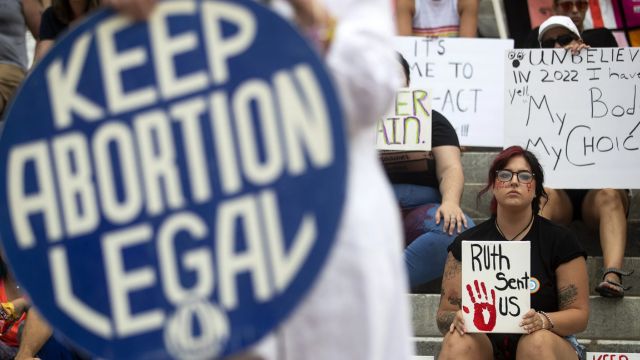Florida’s High Court Clears Path for Abortion Rights Ballot Amidst Legal Tensions
Florida residents will have the opportunity to vote on a ballot measure to enshrine abortion rights in the state constitution, the Florida Supreme Court ruled on Monday, setting up a dramatic electoral showdown over abortion access in a state that has become a haven for women fleeing southern abortion bans.
The judgment is a success for abortion rights supporters, but it is tempered by a second decision delivered on Monday, in which the Florida Supreme Court upheld the state’s 15-week abortion prohibition. That judgment clears the way for a separate six-week abortion ban, which was enacted in 2023 but is on hold until the outcome of the 15-week ban case, to go into force.
The six-week restriction will go into force in 30 days.
- Auto Insurance Shopping Rises in Response to Soaring Insurance Rates: Report
- Avoid These 7 Missteps When Refinancing to a Lower Mortgage Rate
- Rising Home Prices Amid Slight Mortgage Rate Dip: Analysis
- Fresno County’s Groundbreaking Initiative: $500 Monthly Payments in New Guaranteed Income Program, Here is Who is Eligible
- Unlocking Financial Freedom: 5 Reasons to Opt for Personal Loans in Credit Card Debt Repayment
Monica Kelly in Clarksville, Tennessee, on January 27, 2024. Kelly recently sued after being denied a medically necessary abortion.
“I wasn’t allowed to get the healthcare I needed”: the ladies suing Tennessee for being denied abortions.
Read More.
In upholding the 15-week ban, which was enacted shortly before the US Supreme Court overturned Roe v Wade in 2022, the Florida state supreme court overturned a 1989 decision that found that women had the right to abortion through the second trimester of pregnancy due to privacy protections in the state constitution.
“The Florida constitution’s privacy clause makes no mention of abortion and contains no words or phrases that incorporate it. The majority ruling, issued by Justice Jamie Grosshans, states that abortion does not naturally fit within the rights at stake, citing era-appropriate dictionary definitions and contextual hints.
- Will Everyone Get a $12,000 Stimulus Check in 2024? Find Out Eligibility
- $6400 Stimulus Checks in 2024: What You Need to Know About Eligibility and Payment Dates
- IRS 4th Stimulus Check 2024: Comprehensive Guide to Eligibility and Payment Dates
- 3 Smart Moves to Make Once Your Savings Reach $50,000, Here Are Crucial Actions to Take
- 3 Effective Ways to Pay Off Student Loans on a $50K Salary or Less, Know Here!
“Reliable historical sources, like the technical meaning of the terms contained in the provision, the origin of the amendment, and the framing of the public debate, similarly do not support a conclusion that abortion should be read into the provision’s text.”
Grosshans was appointed by Florida’s current Republican Governor, Ron DeSantis. Republicans appointed five of the Florida Supreme Court’s seven judges.
The debate over the constitutional amendment will now become even more important; if passed, it will restore abortion access that was cut short by the six-week ban. The ballot measure’s proposed constitutional amendment would protect access to abortion until fetal viability, which is typically approximately 24 weeks of pregnancy, as well as in circumstances where a doctor determines that an abortion is essential to protect a patient’s health.
Meanwhile, the restriction is expected to have a significant impact on abortion access throughout the southern United States, as people outside of Florida rely significantly on the state for abortions. According to a recent Guttmacher Institute study, nearly 10,000 persons who had abortions in Florida in 2023 came from outside the state. That’s more than quadruple the number of out-of-state abortion patients saw in Florida in 2020, before Roe was overturned.
Ashley Moody, Florida’s Republican attorney general, had petitioned the state’s supreme court to prevent the ballot proposal from reaching voters, alleging that the phrase “viability” has too many interpretations.
Moody had argued in court documents that the language of the ballot measure summary is so vague as to be misleading and is part of a “similar overall design to lay ticking time bombs that will enable abortion proponents later to argue that the amendment has a much broader meaning than voters would ever have thought”.
Moody stated in court filings that by enabling healthcare providers to evaluate whether an abortion is necessary to preserve a patient’s health or if a fetus has achieved viability, the ballot question will deprive the government of power while failing to effectively communicate that shift in power to voters.
In a “per curiam” ruling, which means it was not written by a single judge, the Florida judges rejected that argument.
“That the proposed amendment’s principal goal and chief purpose is to limit government interference with abortion is plainly stated in terms that clearly and unambiguously reflect the text of the proposed amendment,” they said in a statement. “The summary wording demonstrates the vast scope of this proposed amendment. Denying this necessitates a departure from reality.
According to an unofficial calculation from the Florida Division of Elections, nearly 1 million Florida voters submitted petitions to have the item on the November ballot.
Abortion-related ballot proposals are now being considered in approximately a dozen states around the country, including swing states like Arizona and Nevada. Democrats are hopeful that referendums to defend abortion rights will increase turnout and help propel their candidates to victory, as abortion rights have become a winning electoral issue after Roe v Wade was overturned in 2022.
Outrage over Roe’s demise was credited with dampening a much-anticipated “red wave” in the 2022 elections, although voters supported abortion rights even in deep-red states such as Kansas and Kentucky.
“The Florida Supreme Court was right to put the ballot initiative before voters – and it’s a good thing they did because voters will need to go to the polls to undo the damage the court is causing with its decision to allow an extreme abortion ban to go into effect,” Mini Timmaraju, president of Reproductive Freedom for All, said in a statement on Monday. “This is devastating news for access to abortion care in the state and the entire south.”











